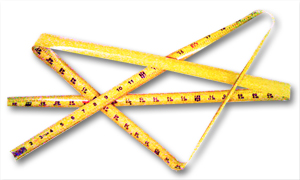July 28, 2010
Self-deceptive measurement was recognized in antiquity. As the New Testament notes, “they measuring themselves by themselves, and comparing themselves among themselves, are not wise” (2 Cor. 10:12). Measurements showing that we’re better than others fatten complacency, but benchmarking our betters shows us how to improve, so what’s deceptive? Perhaps that that old admonition warns us to beware of not looking deeper than cost comparisons, markets, and other people’s performance. For example, one reason for bloated executive compensation is setting it using compensation surveys as a reference. Why be critical of something everyone is doing? But measuring by nature’s yardsticks takes us outside group reference exercises.
Organizational performance systems create conundrums that beg to be address by Compression Thinking, and digging much deeper.
Can’t measure everything, or heed all measurements made. Human perception constricts our attention. We have to focus. As that management adage says, “What gets measured gets done,” so an organization’s performance measurements frame some of its priorities. However, some priorities are difficult or impossible to measure, for example: quality of life for all stakeholders, the effects of trust and distrust, or the values of tacit knowledge and contagious enthusiasm. Attempts to measure the effects of kindergarten programs stretch quantification to ridiculous limits. And yet we sense that the “culture” of a work organization will make or break it because it is the cradle for all the rest.
Compression turns priorities topsy-turvy, but priorities considered most important still overshadow the rest. A “vigorous learning enterprise” trying to contend with this will attempt to function in the interests of all stakeholders as well as nature. If it has long strings of performance measures, the complications appear hopeless. A leadership challenge is reconciling and simplifying the clashes among these responsibilities into a few measures (priorities) on which a large number of real people can focus.
To illustrate the problem, consider energy use, which affects nature, so we’re not just measuring ourselves by ourselves, and minimizing energy use is a common objective today. To go beyond turn-out-the-lights initiatives, energy use must be monitored at points where ideas to reduce use can be implemented. Doing this for processes at key points within four walls isn’t too hard. But extending this to life cycle processes covering all stakeholders makes aggregating even simple measures become complex. Today, big companies struggle to assure that measurements, supposedly of the same thing, from different locations roll up into a consistent, useful picture. But “useful” means actionable back at the many locations from which measures originate. If real people can make local, energy-conserving changes, in big cuts and small, and thus reduce aggregate usage without deceiving themselves, they will perform marvelously well.
Energy saving is a relatively simple, uniform objective to pursue. So how can a “vigorous learning organization” develop itself to do this very, very well? Beyond that, how could it deal with our other big challenges?

